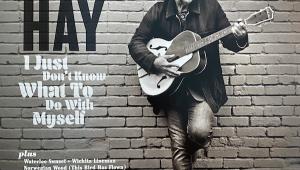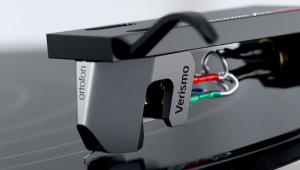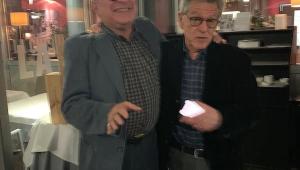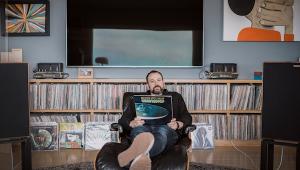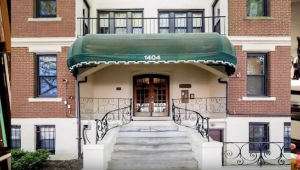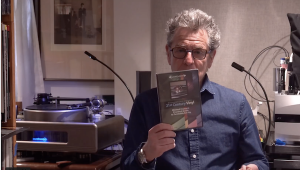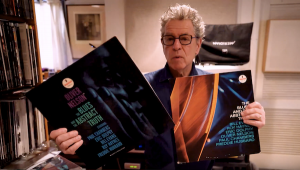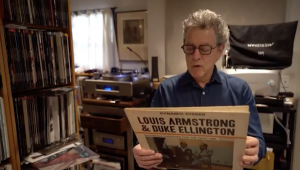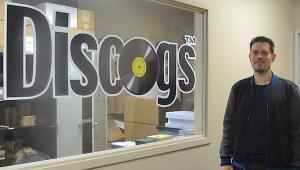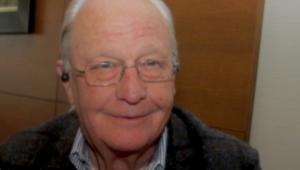Keyboardist Bill Payne on Little Feat’s First New Studio Album in 12 Years, Sam’s Place, and Why He Loves the Recent Slew of Historical 2LP & 3LP Warner Records Reissues That Show How Willin’ the Band Is to Embrace Their Rich Vinyl Legacy

Bill Payne is a glue guy. What I mean by that is, the co-founding keyboardist of Little Feat is the connective tissue that sweetens the musical pot of everything he touches. Whether it’s stirring the California swamp boogie of Little Feat, or the keyboard flourishes he’s added to albums and/or his many live appearances with the likes of Robert Palmer, James Taylor, Emmylou Harris, The Doobie Brothers, and Bob Seger, Payne’s deft touch on piano and keys has long been the musical salve for many a rock track and/or extended jam’s arrangement during the past six decades and counting. In short, the PSS — Payne Support System — is simply a joy to hear on vinyl, the collective result of a maestro at work, providing premium instinctual sonic flavoring and seasoning for all to hear.
The veteran keysman also expertly represents the independent American spirit we’ve been collectively celebrating this extended holiday weekend, and you can hear his latest peppering and panache on Little Feat’s first studio LP in 12 years (and 16th overall), the 145g 1LP Sam’s Place (Hot Tomato Productions). Sam’s Place — a nine-song collection of eight choice blues covers and one one original track — was mostly cut at Sam Phillips Recording in Memphis, Tennessee, in August 2023, except for “Got My Mojo Working.” which was recorded live at the Boulder Theatre in Boulder, Colorado on December 17, 2022.
All nine tracks on this new LP — which was released on May 17, 2024 — are prime examples of how 21st century Feat have got their blues down cold (in the Albert Collins sense of the word, that is). The full character of vocalist/percussionist Sam Clayton’s throaty growl, along with new guitarist Scott Sharrard’s left-channel slide guitar clinic, come through in full on “You’ll Be Mine” (Side One, Track 2), while Payne’s jaunty right-channel piano solos on “Don’t Go No Further” (Side One, Track 4) and “Last Night” (Side Two, Track 6) show the aforementioned PSS remains dutifully intact. Plus, longtime Feat collaborator Bonnie Raitt provides her signature vocals to the Muddy Waters cover “Long Distance Call” (Side One, Track 3), a spirited duet with Clayton on which you should also keep an ear out for the lingering resonance of Sharrard’s Resonator riffage.
“What I’m the happiest about with this record is that we finally get a chance to spotlight Sam Clayton’s voice,” Payne says. “I’ve played on plenty of blues albums over the years with Otis Rush, Buddy Guy, B.B. King, Taj Mahal, Etta James, and John Lee Hooker — I mean, I know blues people (laughs) — and Sam Clayton is one of those people. He’s the real deal, and that’s why I wanted dearly to do this record.” The proof is within the grooves, as we like to say here at AP.

The LP stats are these. Sam’s Place “started and remained” as 24-bit/96kHz files — “the original tracking session, mixes, digital master, and vinyl master,” according to the Feat team, as confirmed directly with AP. Said digital stage doesn’t impede the sound of this LP one whit, as evidence by my listening notes above. The little white sticker on the back cover says, in all caps, “Made in the Czech Republic,” and it was indeed pressed at GZ. My black-vinyl Sam’s LP was (and is) well-centered and quiet, and I only detected two clicks in total — one between Tracks 2 and 3 on both sides, respectively. (Technically speaking, since Side Two continues with numeric sequencing rather than going back to 1, that “click” note translates to Tracks 7 and 8 on the flip.)
The SRP for the black vinyl version of Sam’s Place is $25.99, while the neon orange first pressing goes for $30. The latter can be ordered directly from Little Feat’s official site here, while the black vinyl version can be ordered from Music Direct here. (If MD happens to be sold out of the black vinyl version, it too can be ordered directly from the official Feat site as well.)

In recent years, Rhino and Warner Records have teamed up for an ongoing series of expanded, multi-LP Little Feat catalog reissues, the most recent of which is the 2LP set for August 1974’s Feats Don’t Fail Me Now, which sports an SRP of $34.99 and was released on June 14, 2024. (You can order it from Music Direct right here.) According to the label, Feats LP1 was done in the analog domain, while the bonus material and outtakes on LP2 were done digitally. Bernie Grundman cut the lacquers, and the LPs were pressed at Memphis/GZ. Since Warner Records issued 3LP sets for February 1972’s Sailin’ Shoes and January 1973’s Dixie Chicken a year prior to Feats, it seems like more will be forthcoming. (Hear, hear — or rather, hoy hoy.)
Thanks to the fine vinyl sounds of both Sam’s and the recent catalog reissues, my ears have most decidedly not been “buffaloed in Buffalo,” to borrow part of the opening line to the Payne/Hayward composition “Tripe Face Boogie,” which appears as Side 1, Track 4 of the above-noted Sailin’ Shoes. In a recent Zoom interview, Payne, 75, and I discussed how Sam’s Place came together so instinctively, what some of his favorite vintage Little Feat tracks are on vinyl and why, and how the band mixes complexity and beauty together to create such a signature sound. Well, they say that time loves a hero / But only time will tell. . .

Mike Mettler: I’m glad you guys gave us the opportunity to listen to Sam’s Place on vinyl. Was it important to you to make sure we got to hear it that way?
Bill Payne: Yes, it was. It is, and it will be. Yeah, vinyl is important. The record itself contains a lot of information on it. The music is obviously important, but so is the rest of it. It’s also the holding of something in your hands, right? I’m really glad we got to do that with Sam’s Place.
Mettler: Me too. And you make a good point about all the “information” on the record, something that makes me think of a track like “Last Night” (Side Two, Track 6), which has a lot of great work from you on it. In general, we need to hear the vinyl to get the full effect of the arrangement palette Little Feat has created with over 50-plus years’ worth of recordings. I’m sure you feel that way too.
Payne: I do. You know, we were just down at Blackbird Studios and Sputnik Sound in Nashville, recording some new music with producer Vance Powell. He’s worked with Phish and Chris Stapleton, and he’s just a wonderful guy. We really liked what we did on Sam’s Place, and this is just a continuation of that. The music’s different, and more challenging, because it’s Little Feat music rather than the blues. The same energy, and this camaraderie that went into making Sam’s Place, was definitely there on this as-yet-untitled album we just finished. It should come out in 2025. It still has to be mixed — but, boy, it sure sounds great.
Mettler: Oh, cool, I’m glad to hear that — and it sounds like that means there’s another story for us to do together next year. Getting back to Sam’s Place for a minute, was everybody in the same room for the most part while you were recording it, and looking at each other? How was it set up?
Payne: Yeah. Let’s see — I had, in front of me, Kenny Gradney on bass. [Guitarist] Fred Tackett was over to my right. Sam Clayton was in a little enclosed booth for his vocals, but there was a big window there, so you could see him. Scott Sharrard was also enclosed because of his guitar amps. He was to the left of [drummer] Tony Leone, and Tony was just to his right, so we were all able to see each other.
At first, they didn’t have monitors. The studio people were like, “Well, that’s the way we do it down here.” And I thought, “Well, that’s not the way we do it, but okay!” (laughs heartily) We finally got some monitors set up through Charlie Martinez — Charles A. Martinez, our engineer. Oh, and I was playing Jerry Lee Lewis’ piano too.
Mettler: Oh wow, that must have been something else. That must have been quite an experience.
Payne: Oh yeah, it was cool. It was set up there, and I played it, man. (chuckles) You know, I also got to play [the brilliant, late pianist for The Band] Richard Manuel’s piano in 2012 on a record of ours called Rooster Rag [released in June 2012, on Rounder]. He always said, “That instrument plays itself,” and I would go, “You know, I agree. It does.” (smiles)
Mettler: That’s amazing. To me, the overall vibe of Sam’s Place feels like how you guys play off of each other live. There’s that sightline connection that you guys have, for one thing. Right out from the milking gate — the “Milkman” gate, we’ll call it (laughs) — that song tells us immediately that you guys have it nailed. Did “Milkman” seem like it had to be the lead-off track? Did you guys have the sequencing naturally figured out, or did you have to play with it a little bit?
Payne: I think that part of it was a little more natural. and there weren’t that many iterations of what we were working on, to be honest. I made a few suggestions toward the end of the album — “Place this here, try this there” — but we were all producing it together, so that made it easy. It was always our call.
Mettler: Yeah, I totally get that. I also like how you have “Got My Mojo Working” as the live button, so to speak, as the very last track on Side Two [Track 9]. I think that’s a nice postscript, or whatever you want to call it, to bring us full circle in the blues realm.
Payne: Well, thank you. Yeah, that was my feeling too. We recorded 15 songs, and I warned everybody. I said, “Look, we can’t put 15 songs on this record, so we’re gonna have to cut a couple songs” — and I even had to cut a couple of mine before we even recorded them. But I also said, “The good news is, if this is the right record, and I know it is, then we’re gonna be doing another album — and we’ll put ’em on that one.”
I’ll tell you how it worked. It’s mainly losing songs rather than losing solos, or cutting things back on that level. I wanted to make sure, as we all did, to have the right record. I thought we did some pretty good things at the soundchecks as well, but the studio was really the place to do it, so we all had a hand in it. While we gave each other the room to produce, I also gave the room to myself as well. I mean, I’m one of the guys, so if I come up with ideas, I’m not shy of saying what I would like to hear or see. It doesn’t have to go my way — but I’ve got good ideas, and usually, it does. (smiles)

Mettler: Everybody wins when you do it like that, I think. I also went back to, literally, Little Feat, Album 1, Track 1 [via the 180g 2008 Mobile Fidelity LP version of their January 1971 Warner Bros. debut record, that is], and started it by listening to the lovely opening track that’s named “Snakes on Everything.” If I remember correctly, that was a phrase you came up with — and it was a twist on something else. Please tell me the full origin of the “Snakes” title.
Payne: (laughs) Yeah, I’ll start with telling you that I’m writing a book called Carnival Ghosts, and in it, I talk about this story. [Drummer] Richie Hayward and I were discussing a song I’d written called “Thanks for Everything.” He looks at me and goes, “Snakes on Everything?” I go (adopts sarcastic tone), “Yeah, ‘Snakes on Everything.’”
Mettler: (laughs) That’s just too funny. I mean, he kind of Ringo-ed it there, right? That’s a classic Ringo Starr kind of thing. It’s like [The Beatles’] “Tomorrow Never Knows,” but the Little Feat version.
Payne: (laughs) Exactly! It must be a drummers’ thing. They twist words and phrases around. I don’t know, he may have thought that’s what I said. I had probably more of a nasal thing going back then than I do now, but . . . (chuckles) [Co-founding Little Feat drummer Richie Hayward sadly passed away at age 64 in August 2010.]
Mettler: Yeah, isn’t that something? But it’s also interesting that “Snakes on Everything” is the first taste of the whole band. Did you know that song was going to be the opening thing that people would drop the needle on for the first Little Feat record?
Payne: No, I didn’t! But that was cool. Well, it’s been a long, interesting ride, or a long strange trip, as [Grateful Dead lyricist] Robert Hunter used to say. And in my book, by the way, I’m not telling the story of Little Feat — I’m telling my story, but it’s within the connection of Little Feat, which is in itself interesting enough.
Mettler: Yeah, can’t wait to read it once you get it done. Well, now I want to jump you back into your own memory bank a little bit further. When you were growing up, was there a 45 or an album that was the first one that you got as a kid, the one that you’re like, “This is my talisman record”? Like, the first one you really got excited about to buy and/or play as a kid growing up?
Payne: Well, I’ll do it in two parts. My sister, Ann, who passed away a few years ago, she was 81. She graduated high school in, I think, ’58, maybe ’57, so she had the big poodle skirts and the two-toned shoes, and [Dwight D.] Eisenhower was the president. The first time she went down to a record store, she had picked up a record, “Hound Dog,” by Elvis Presley. Three years before that, on a visit to Aunt Leila’s house in Texas — we were living in California by that time — she had heard of this guy, Elvis Presley, and it wasn’t until three years later purportedly that he came out with that record, so she was in the loop pretty early. I really associated with that record. I did like the song, and I liked the rock & roll beat — but I also liked the photo of the dog listening to the gramophone, since it was on RCA Records [and released in 1956].

Mettler: Yeah, that’s such a great image, right?
Payne: Oh yeah. So, part two of this is, the first record I actually got was a record that I won. It was a 45, and that was back when we did the rotary-phone dial-ups when you heard the DJ say, “The first call that comes in.” You dial all five numbers or whatever it would be — and you’d hold that last number until he goes, “Okay,” and then you’d let it go. So, the first record I won was “The Ghost of Billy Malloo” by Dorsey Burnette [released in 1960 on ERA Records]. And Dorsey Burnette’s son, Billy Burnette, many years later, was doing his own thing, but he also played with Mick Fleetwood and Fleetwood Mac.
Mettler: Yeah, he came into Fleetwood Mac after Lindsey Buckingham left in 1987, and Billy was also on their Behind the Mask album, I think. [He was indeed on guitar and vocals on Behind the Mask, which was released in April 1990 on Warner Bros., and Burnette was also on the Mick Fleetwood’s Zoo 1983 LP on RCA, I’m Not Me.]
Payne: He wound up being on a lot of cool stuff, yeah.

Mettler: He sure was. Now, while I was listening to my Little Feat LPs, I was also thinking, “What are some of the best Bill Payne moments on vinyl?” One of the tracks that fit that bill for me was “Cat Fever,” on Sailin’ Shoes (Side 2, Track 4). What can you tell me about that particular song? That one’s got a lot of great Payne stuff on it, I have to say.
Payne: Well, thank you. It’s actually a very dark song. It was a dark era. I was living in Lowell’s house [as in, the house of the late, great Little Feat co-founding guitarist/vocalist Lowell George]. And then Patty, whose one sister was married to Richie Hayward and the other sister was married to Rick Harper, our road manager — their mother was Loulie [Jean Norman], and she sang on “The Lion Sleeps Tonight” [the hit 1961 version by The Tokens], and she also did the “woooooo-ooo-ooo-oooh” part on the Star Trek theme [composed by Alexander Courage for the original 1966-69 TV series]. She was one of those people.
Payne: Anyway, she brought some cats with her and I was allergic to cats, so I wound up sleeping in Lowell’s van for a little while. It was hotter than heck that summer, and the LaBianca family, which lived less than a mile from Lowell’s house, had just been murdered. The Tate-LaBianca murders had just taken place [in August 1969], and I was up in Santa Barbara, sleeping on the beach up there with some other crazy people. It was a weird period of time, so that’s why I was throwing in those images about cats and demons and all these other things (chuckles) — and all the blues stuff too. But, yeah, it’s an interesting song. I thank you for picking it out.

Mettler: No problem — though I guess I didn’t realize how dark it actually was! (laughs) I also like the instrumental track that’s at the end of Dixie Chicken, “Lafayette Railroad” (Side 2, Track 5). What a great piece that is.
Payne: Yeah. Lowell and I — and probably Richie, too, because we used to set up in his living room — we’d play that song from time to time. It’s kind of cool. I love the feel of it. We were playing it just recently with the new Incarnation of our band.
Mettler: Oh, I’d love to hear that. Since you’ve been looking back at your career for the book, is there anything in the Little Feat catalog you’d like to highlight for people — as in, “Hey, check this out on vinyl”? Like a lost gem, or something you’d like people to focus on when they drop the needle?
Payne: Well, I’ll tell you what — you can choose just about any Little Feat track, but I’m going to go back to the very first [self-titled] album, and it’s a song called “Strawberry Flats” (Side 1, Track 2). When I played live with James Taylor, many years later — (sings), “whenever I see your smiling face,” right? [“Your Smiling Face,” originally on June 1977’s JT, on Columbia] — there’s a different chord on just about every beat (sings the chord sequence). That kind of stuff. Well, we [i.e., JT’s band] weren’t copying that song, but “Strawberry Flats” has a very similar thing to it. For you musicians out there, try playing that song, and you’ll see what I’m saying. It’s not easy.
Payne: But, as a listener — and this applies to a lot of stuff we do — as a listener, it sounds like you’re just falling off a log. That’s the complexity of Little Feat, but it’s also the beauty of the band too. We play complicated music, but it does not sound complicated.
Mettler: That’s such a good point. Sometimes, as a listener, I feel like I have to put the records on multiple times to get everything. Even a a track like “Sailin’ Shoes,” in and of itself, seems very straightforward, but it’s a bit more complicated. And then when you hear somebody like Robert Palmer do it [as the opening track on his debut solo LP, September 1974’s Sneaking Sally Through the Alley, on Island] — even with Lowell George also playing on it! — you get two completely different versions of the same universe, in a sense.
Payne: Right, right. And it’s just music, but the power of music is still there. I mean, I remember for a while — not so much now — but I’d say before Covid hit, people were deriding music as if it didn’t mean anything. And I went, “Bullsh--! It does.” That’s a perspective that is not well thought out, first and foremost. I’m sorry that it took something like that horrible thing we all had to go through to put it back into perspective for us. It’s not “just” the music — it’s about things that drive your inquisitive nature if you have one, right? What you read, what you eat, what you watch, the friends you surround yourself with — all those things. That’s an extension of what music does. It’s about communication, community — and why you and I are speaking right now.
Mettler: And we’re all the better for it, I think. You know, I really love the current batch of Little Feat vinyl reissues that Rhino and Warners are doing together. It seems like they’re doing them fairly chronologically, but I’m putting in a request for [April 1990’s] Representing the Mambo right now — so if you don’t mind asking them to make sure that one’s on the list, I’d sure appreciate it. (laughs)
Payne: Yeah, and as you know, Feats Don’t Fail Me Now is the most recent one. It’s the litany of work, which is great. So, yeah, we’ll see what’s next.

Mettler: Yeah, fair enough. I also like the amount of care they’ve been putting into these first couple of reissues — sometimes we get 3LP sets, other times 2LPs, and with full gatefolds too. I love how they’re doing all that, because I feel like those of us who had these records originally are now getting even more out of them. But also, people who never really heard anything from Little Feat except maybe for a few tracks on the radio now get a chance to learn about a special musical universe they never knew much about, which I think is great.
Payne: Yeah. That discovery thing for them is exactly what it was for us. The fun of it was, from week to week, month to month, year to year, you’d be sitting there going, “All right, what are The Stones going to do? What are The Beatles doing? What’s [Bob] Dylan coming up with? What are The Band? Who are they? What’s Big Pink?”
All that stuff — It’s about the discovery of music. And then, from that discovery, you find out what their influences were, and that leads into all these other discoveries you can have. It’s an endless stream of things that can be exasperating at times when you think about all that’s going on when you’re trying to keep up with it all — but we’re like archaeologists, right? We’re just going through all the music that’s out there.
Mettler: Yes! Yeah, that’s exactly right. It’s music archaeology — or musicology, or whatever you want to call it. Well, I know you have to get back to writing your book — and I really appreciate all the time and insight you’ve been able to share with us today. So, I have one wrap-up question I like to ask everybody. I’m going to throw us 50 years into the future to 2074. And, as I like I say, you and I may not physically be on the planet then unless there’s some weird science going on. (both laugh) But, at any rate, however people listen to music in those future days, and they either type in “Little Feat” or “Bill Payne” into that device, what kind of listening experience do you want somebody in the future to get from your music?
Payne: Well, I’d like them to, depending on what they’re listening to, get a sense of time and place — of energy, of solitude, and of tears and laughter, right? That’s what I’d like for them to experience.

LITTLE FEAT
SAM’S PLACE
145g 1LP (Hot Tomato Productions)
Side One
1. Milkman
2. You’ll Be Mine
3. Long Distance Call (Featuring Bonnie Raitt)
4. Don’t Go No Further
5. Can’t Be Satisfied
Side Two
6. Last Night
7. Why People Like That
8. Mellow Down Easy
9. Got My Mojo Working (Live)
Note: Rather than starting over at 1, all the track numbers continue sequentially on Side Two from 6-9 instead.

LITTLE FEAT
FEATS DON’T FAIL ME NOW (DELUXE EDITION)
2LP (Warner Records)
LP1: Original Album (2024 Remaster)
LP1, Side 1
1. Rock & Roll Doctor
2. Oh Atlanta
3. Skin It Back
4. Down The Road
5. Spanish Moon
LP1, Side 2
1. Feats Don’t Fail Me Now
2. The Fan
3. Medley: Cold Cold Cold / Tripe Face Boogie
LP2: Hotcakes, Outtakes, Rarities
LP2, Side 1
1. Brickyard Blues – Outtake
2. Feats Don’t Fail Me Now – Alternate Version
3. Rock & Roll Doctor – Alternate Version *
4. Spanish Moon – Alternate Version *
5. Skin It Back – Alternate Version *
6. Oh Atlanta – Alternate Version *
LP2, Side 2
1. All That You Dream – Outtake
2. Front Page News – Alternate Version *
3. Long Distance Love – Outtake *
4. Lonesome Whistle – Alternate Version *
5. Day At The Dog Races – Unfinished Outtake *
6. Spanish Moon – Single Version
* previously unreleased




